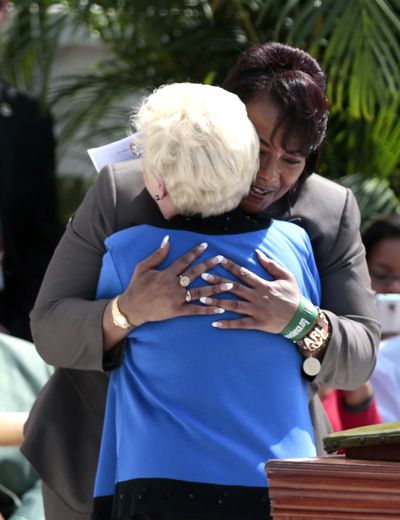Daughters of King, Wallace unite for 50-year-march in Alabama

MONTGOMERY, Ala. – The daughters of two major figures of the civil rights era, Martin Luther King Jr. and former Alabama Gov. George Wallace, shared a stage on the steps of the Alabama Capitol on Wednesday to mark the 50th anniversary of the 1965 Selma-to-Montgomery voting rights march.
While their famous fathers were on opposite sides of history 50 years ago, the two came together to mark the milestone anniversary.
Bernice King stood near where her father stood in 1965 to read the “How Long, Not Long” address he gave civil rights marchers on March 25, 1965.
“Today, I stand where he could not stand, to synthesize our past with our present and speak those same words that he spoke,” she told the crowd.
In an interview, Bernice King said the commemoration was a reminder of her father’s “prophetic” words. She said the words he spoke to the crowd at the steps 50 years ago are still relevant.
“I think it’s important going forward that we really grab hold to and embrace my father’s nonviolent philosophy and methodology. That’s the way forward for any social change issue in this country,” King said.
Peggy Wallace Kennedy acknowledged her father’s place on the wrong side of history, but that he eventually found “a redemption and understanding of the injustice and suffering of inequality” after he was paralyzed by a would-be assassin’s bullet. Wallace, the former governor, was a segregationist who opposed civil rights in the 1960s but later apologized.
“On that day my father could not have known that he was already traveling on his own personal road to Jericho,” Kennedy said.
The voting rights march commemoration came on the same day that the U.S. Supreme Court ruled in a challenge to Alabama legislative districts brought by black lawmakers. Justices said a lower court must take another look at whether Alabama’s Republican-led legislature relied too heavily on race when it redrew the state’s voting districts.
Black lawmakers argued the plan packed black voters into majority-black districts and limited their ability to influence elections outside those districts.
Thousands gathered outside the Alabama Capitol for the final event in a nearly monthlong commemoration. Hundreds retraced the final leg of the 1965 march to the Alabama Capitol. The crowd ranged in age from children being pushed in strollers to people who marched in 1965. The route wound through the city’s historic neighborhoods, including near the spot where Rosa Parks lived and the barbershop where King got his hair cut.
In 1965, Wallace did not meet with marchers, but watched from his Capitol office window. In 2015, Alabama Gov. Robert Bentley welcomed the predominantly black crowd and acknowledged the state has changed.
“Alabama made history for all the wrong reasons, but today Alabama is different,” Bentley told the crowd.
“Today is a vivid reminder of how far we have come as a state and as a nation. It is also a reminder of what happens when you never give up.”